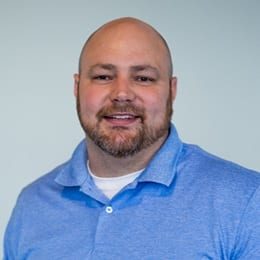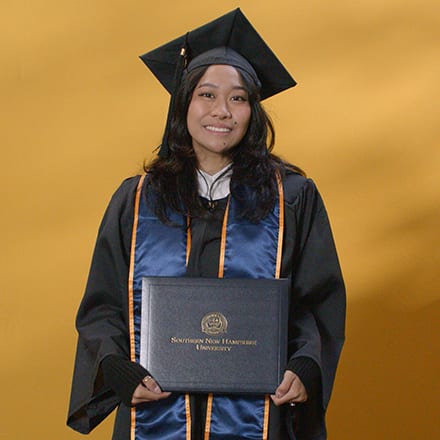Academic Spotlight: Dr. Nickolas Dominello, Senior Associate Dean of Social Sciences

Dr. Nickolas Dominello, a senior associate dean of social sciences at Southern New Hampshire University, began his career in education teaching high school psychology classes. Since transitioning to higher education, he said hearing from students is one of the things he enjoys most about his job. Recently he answered questions about his background, how he makes those connections with online students and more.
Can you tell us about your professional background?
In my heart, I've always been an educator. Early in my professional career, I spent time as a high school social sciences teacher, teaching psychology and AP psychology courses. This position merged my love of education with my passion for the field of psychology. While honing my pedagogical skills as a teacher, I established the foundation for my eventual transition into higher education.
What first drew you to higher education?
I began teaching psychology courses as an adjunct professor soon after commencing my career in secondary education. Things fell into place, and I started working for a collection of universities, teaching as many courses as I could. This experience led me to consider returning to graduate school to become a PhD in Psychology. Between my position as a high school teacher, my adjunct work, and being a new father, many personal sacrifices were made to attain my dream of working full time in higher education.
What aspects of your own education have been influential in shaping your career in academia?
Like many, I made mistakes early in my education, particularly in high school. However, when I transitioned to college during my undergraduate years, I developed a passion for learning. Further, I became enthusiastic about challenging myself to achieve more and more with each course and semester. I began to view obstacles as opportunities for self-development. Along the way I had some fantastic professors who pushed me to expand my horizons and reach my potential. These transformative learning experiences fueled my lifelong learning orientation an inspired me to help students along their respective academic quests.
What attracted you to this field of study? What keeps you excited about it?
When I was 15 years old, I skipped high school one day (one of the mistakes I mentioned) and accompanied my older sister to her undergraduate psychology class. I was enthralled by the conversation the students were having and the subject matter resonated with me. This was my first experience with the field of psychology and higher education. I knew after this experience that psychology was the field of study I wanted to explore further after high school.
Psychology is all about the human experience and the field continues to evolve as the world gets more complex, helping us navigate current challenges and future obstacles. An enhanced understanding of the mind and behavior equips individuals with knowledge to successfully circumvent challenges, intrapersonal and interpersonal, and become more productive member of society.
How have you found ways to effectively connect with students?
The first step to effectively connecting with students involves getting to know them and understand a bit about their goals and interests. Simply opening the conversation with students in an inviting way allows for open communication. Encouraging students to reach out if they have questions, providing welcoming announcements, and engaging in discussion boards provide communication channels and demonstrate that I am available to support students to the extent that they wish.
Often, students are eager to connect because they wish to learn about our professional experiences because we work in a field that they aspire to join. Being able to establish rapport with students affords opportunities to discuss potential career paths, field related trends, and tips for mitigating potential professional pitfalls.
What brings you the greatest joy in your work as a senior associate dean?
Whether overseeing curriculum decisions, holding student events, or working with fellow associate deans or faculty, seeing the larger positive impact that our work has on students is what brings me the greatest joy as a senior associate dean. Hearing directly from students about their positive learning experiences here at SNHU “fills my bucket,” in the words of my eight-year-old daughter.
What do you feel is unique about the faculty and students you work with?
I could answer this question with one word, resilience. The faculty I work with and so many SNHU students persevere through many life challenges. Many learners and faculty who I had the pleasure to work with have overcome these challenges, kept their goals in sight, and successfully crossed over the finish line. I believe that SNHU fosters this resilient nature because of the team orientation embedded in our culture.
What does SNHU’s mission to transform the lives of learners mean to you?
Above I mentioned how my learning journey really took off as an undergraduate learner. At that time, I adopted the mindset that learning is a life-long process and the journey neither begins nor ends with a solitary event, but rather transforms as new knowledge combines with one’s current understanding of the world. This is a reminder that I always share with students. Success in higher education means different things to students. Regardless of an individual student’s goals, these individuals evolve and develop as a member of the SNHU community and carry these transformative experiences throughout their lives.
Outside of work, what’s something you’re passionate about or really enjoy doing?
Outside of spending time with my three awesome kids and wonderful wife, I enjoy playing basketball. I played basketball in college and into my mid-twenties, stopping when I enrolled in my doctoral program. I attempted to jump back into playing after a decade away from the sport but was quickly sidelined by a serious injury. In 2020, after much rehabilitation, I was able to play basketball again and now, I get to play about three times a week.
A degree can change your life. Choose your program from 200+ SNHU degrees that can take you where you want to go.
Joe Cote is a writer and organic marketer at Southern New Hampshire University (SNHU), where he has worked since 2016. Previously he spent more than a dozen years as a reporter and editor at weekly and daily newspapers in Vermont and New Hampshire. He lives near SNHU's Manchester, New Hampshire campus with his wife and daughter. Connect with him on LinkedIn.
Explore more content like this article

SNHU Spotlight: Carlene Estigoy, BA in Psychology Grad

What Can You Do With a Homeland Security Degree?

A List of Helping Professions: Big Hearts, Big Opportunities
About Southern New Hampshire University

SNHU is a nonprofit, accredited university with a mission to make high-quality education more accessible and affordable for everyone.
Founded in 1932, and online since 1995, we’ve helped countless students reach their goals with flexible, career-focused programs. Our 300-acre campus in Manchester, NH is home to over 3,000 students, and we serve over 135,000 students online. Visit our about SNHU page to learn more about our mission, accreditations, leadership team, national recognitions and awards.

